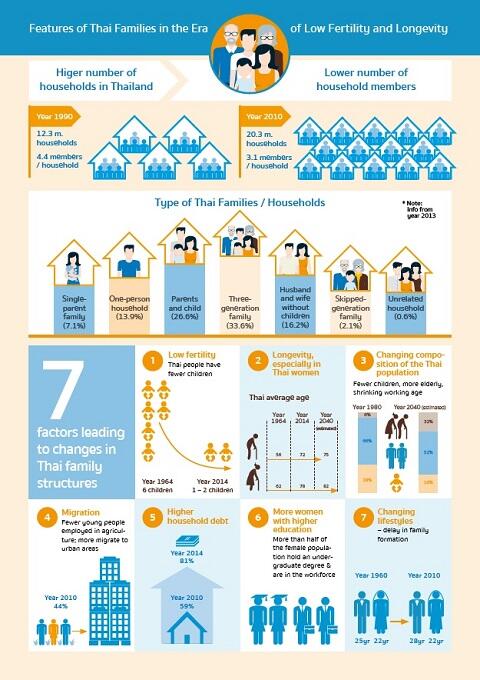by The Nation
Extended families have made a comeback, with multi-generational family units again forming the biggest group in Thai society.
Of all households in the country, 37 per cent are now extended families with members of three generations living together under the same roof, according to a 2015 report.
“This means extended families is the biggest group in the country – not nuclear families,” Nattaya Boonpakdee of the United Nations Population Fund (UNFPA) Thailand said yesterday.
In the face of growing urban development and Westernisation, nuclear families were once poised to replace extended families in Thai society.
But the 2015 report, which analyses information from Thailand’s National Statistical Office (NSO), showed nuclear families accounted for just 27 per cent of Thai families.
Nattaya emphasised that relevant organisations would need to stay abreast of the situation regarding families so as to formulate effective policies. “It should be noted that 16 per cent of Thai families are now childless couples. About 14 per cent are one-person families while seven per cent others are families with children plus single mums or dads,” Nattaya said.
She added that about one per cent of families comprise people who had remained together even though they were neither married nor blood-related.
Rural couples having more kids
“Modern-day definitions of families in Thailand are not the same as before. Laws and welfare provision therefore should be adjusted accordingly,” she said.
Nattaya urged all relevant organisations to conduct qualitative – not just quantitative – research to determine Thai families’ needs and to respond to them efficiently.
Even in rural zones, the number of childless couples has already jumped threefold – a much higher rate than in towns.
She was speaking at an event on Thai Families 4.0, which highlighted family issues ahead of Thai Family Day on Friday.
A recent survey among Thai youths reflected that Thailand’s family situation is good, with young members cherishing family warmth, love and quality time.
The survey was conducted among 824 youths aged between 15 and 24.
“Up to 41 per cent of respondents defined family with love and attachment, while 29 per cent others defined it with living together,” Penpan Chittasenee of the Thai Health Promotion Foundation said at the event.
Up to 83 per cent of those surveyed said they were very happy spending time with their families, while 92 per cent felt secure in the arms of family members.
NSO records have also shown that Thais now spend more time with their families – an average of nearly three hours a day, up by about one hour.
The survey found Thai youths were most worried about health problems, quarrels and debts when asked about their family concerns.
Ittipong Thongdaeng, who chairs the Ubon Ratchathani Youth Council, said that a recent workshop showed children were also uncomfortable with “silent treatment” in the family.
Read the State of Thailand's Population Report 2015: Features of Thai Families in the Era of Low Fertility and Longevity here.
See the infographic summarizing the report, in English and in Thai.



